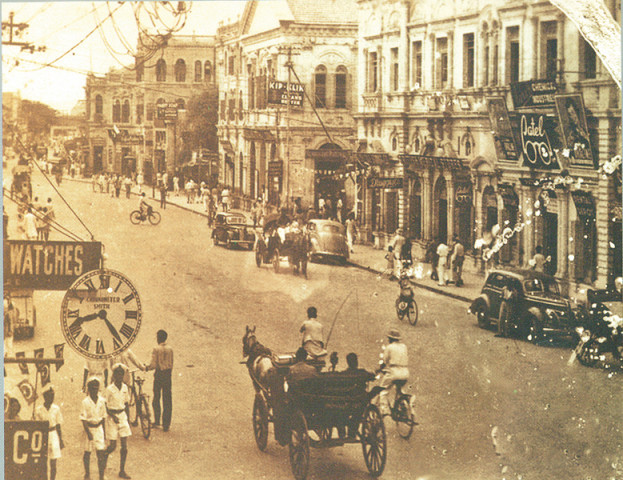Research study: ‘British befriended Sindhi merchants, learnt Sindhi to control the region’
Mathew A Cook, Michel Boivin analyse cultural landscape that built the British Empire.

One of the first tasks undertaken by the British was the construction of the Sindh-Pishin Railway line (above). A busy street in Karachi where horse-driven buggies ran side-by-side with motor vehicles (below). PHOTO: COURTESY ‘A MONOGRAPH OF SINDH THROUGH THE CENTURIES’
Two academics from the United States and France - Mathew A Cook and Michel Boivin - shared their ongoing research on the British Raj on Wednesday evening at the Oxford University Press bookshop. They elaborated on how the relationship between Company officers and local traders turned from hostility to friendship. Sindhi became a compulsory language for British officers and even when they had no interest in Sufi poetry, they learned it to control the region.

Cook, an assistant professor of post-colonial and South Asian Studies at North Carolina Central University, examined the relationship between the two. He looks beyond the game of money and politics and analyses the traders’ support for the Empire. He gave the example of Seth Naomal, a trader who collaborated with the British to support the annexation of Sindh by challenging the socio-cultural lines.
Cook was of the view that cultural features help world empires understand the temperament of different places. Throughout the history of Sindh, local insights have been overlooked since much of the region’s history remained choked by the economics and politics of the colonial state and its ideologies. “Culture is never a simple concept but rather a ‘re-appropriation’ within an ongoing field of distinction that is both contingent and contested,” he said.
South Asian communities were connected to wider worlds by the political economy of the empire, Cook pointed out. However, such a perspective should not negate the role of colonialism in shaping how people make and remake their cultural worlds. “Culture is a fragmented concept and not the natural property of any community.”

The research examines how the cultural distinctions became sites of agitation and increased differences among people. The paper looks beyond the crucial importance of money and politics in colonial expansion.
Boivin, a research fellow at the Centre for Indian and South Asian Studies, National Centre for Scientific Research in France, uses his paper on ‘Language, Literature and the Building of Sufi Culture in Sindh’ to examine the effect of printing press on events.
He starts by unfolding events from 1850 to 1857, adding that the British Commissioner of Sindh, Bartle Frere, had decided to make it compulsory for the British officers to learn the Sindhi language. “It was an important step to know first and then control the society.”
In his talk, Boivin mentioned the publication of the translation of Shah Abdul Latif Bhittai’s poetic compendium, Shah Jo Risalo, in a German academic journal in 1863 by Ernest Trumpp, a minister of the Church of England. “They [British] had no interest in Sufi poetry but they learned it so they could control the region,” he said. “Subsequently, a new social class was born.”
On Sufism, he said that Fateh Muhammad Sehwani was the first to publish a book on Lal Shahbaz Qalandar in 1904, adding that he did not belong to any powerful group but published the book, Tazkira-e-Lal Shahbaz Qalandar. “It was not a classical Tazkira, like Tazkira-e-Aulia, but an attempt to expose Qalandar’s life, his family and Sajjada Nasheen.”
Boivin also mentioned Jethmal Parsram (1886-1947), who published his Sufi Sagora book in 1921 to bring Sufism to the front. He also cited the spiritual movement and the formation of the theosophical society. “Sufism was used to build the brotherhood in Sindh.”
Published in The Express Tribune, March 28th, 2014.





1724319076-0/Untitled-design-(5)1724319076-0-208x130.webp)













COMMENTS
Comments are moderated and generally will be posted if they are on-topic and not abusive.
For more information, please see our Comments FAQ